Serdar Kadioglu
Global Constraint LLM Agents for Text-to-Model Translation
Sep 10, 2025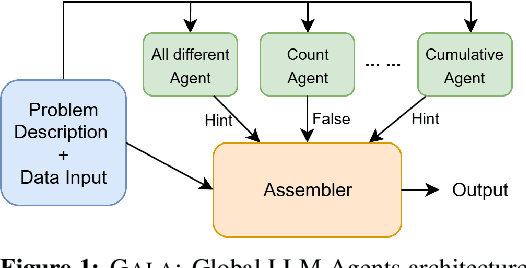

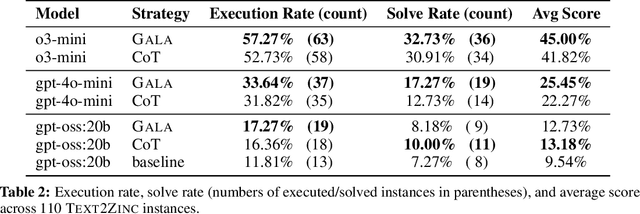
Abstract:Natural language descriptions of optimization or satisfaction problems are challenging to translate into correct MiniZinc models, as this process demands both logical reasoning and constraint programming expertise. We introduce a framework that addresses this challenge with an agentic approach: multiple specialized large language model (LLM) agents decompose the modeling task by global constraint type. Each agent is dedicated to detecting and generating code for a specific class of global constraint, while a final assembler agent integrates these constraint snippets into a complete MiniZinc model. By dividing the problem into smaller, well-defined sub-tasks, each LLM handles a simpler reasoning challenge, potentially reducing overall complexity. We conduct initial experiments with several LLMs and show better performance against baselines such as one-shot prompting and chain-of-thought prompting. Finally, we outline a comprehensive roadmap for future work, highlighting potential enhancements and directions for improvement.
Balans: Multi-Armed Bandits-based Adaptive Large Neighborhood Search for Mixed-Integer Programming Problem
Dec 18, 2024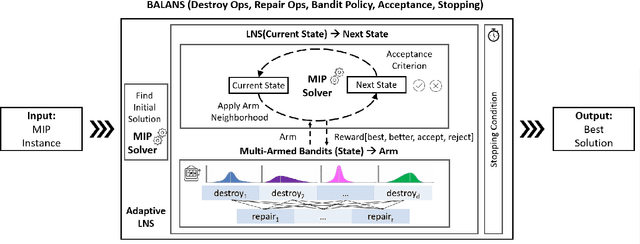
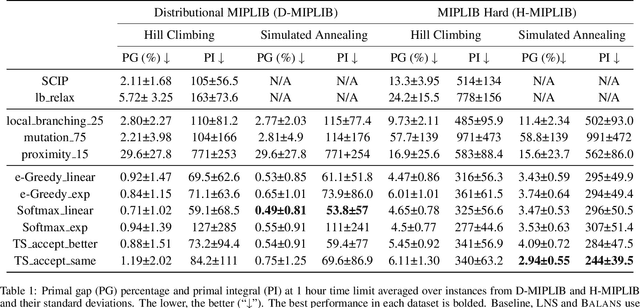
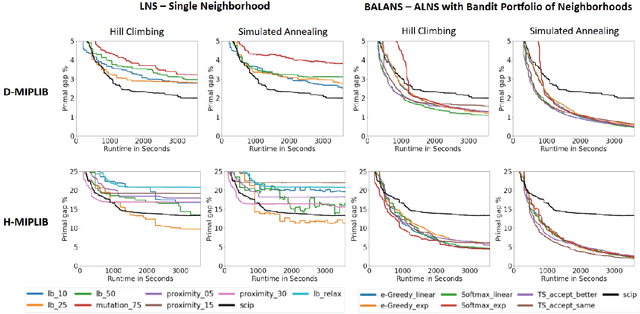

Abstract:Mixed-Integer Programming (MIP) is a powerful paradigm for modeling and solving various important combinatorial optimization problems. Recently, learning-based approaches have shown potential to speed up MIP solving via offline training that then guides important design decisions during search. However, a significant drawback of these methods is their heavy reliance on offline training, which requires collecting training datasets and computationally costly training epochs yet offering only limited generalization to unseen (larger) instances. In this paper, we propose Balans, an adaptive meta-solver for MIPs with online learning capability that does not require any supervision or apriori training. At its core, Balans is based on adaptive large-neighborhood search, operating on top of a MIP solver by successive applications of destroy and repair neighborhood operators. During the search, the selection among different neighborhood definitions is guided on the fly for the instance at hand via multi-armed bandit algorithms. Our extensive experiments on hard optimization instances show that Balans offers significant performance gains over the default MIP solver, is better than committing to any single best neighborhood, and improves over the state-of-the-art large-neighborhood search for MIPs. Finally, we release Balans as a highly configurable, MIP solver agnostic, open-source software.
Dichotomic Pattern Mining with Applications to Intent Prediction from Semi-Structured Clickstream Datasets
Jan 23, 2022



Abstract:We introduce a pattern mining framework that operates on semi-structured datasets and exploits the dichotomy between outcomes. Our approach takes advantage of constraint reasoning to find sequential patterns that occur frequently and exhibit desired properties. This allows the creation of novel pattern embeddings that are useful for knowledge extraction and predictive modeling. Finally, we present an application on customer intent prediction from digital clickstream data. Overall, we show that pattern embeddings play an integrator role between semi-structured data and machine learning models, improve the performance of the downstream task and retain interpretability.
Integrated Vehicle Routing and Monte Carlo Scheduling Approach for the Home Service Assignment, Routing, and Scheduling Problem
Jun 30, 2021



Abstract:We formulate and solve the H-SARA Problem, a Vehicle Routing and Appointment Scheduling Problem motivated by home services management. We assume that travel times, service durations, and customer cancellations are stochastic. We use a two-stage process that first generates teams and routes using a VRP Solver with optional extensions and then uses an MC Scheduler that determines expected arrival times by teams at customers. We further introduce two different models of cancellation and their associated impacts on routing and scheduling. Finally, we introduce the Route Fracture Metaheuristic that iteratively improves an H-SARA solution by replacing the worst-performing teams. We present insights into the problem and a series of numerical experiments that illustrate properties of the optimal routing, scheduling, and the impact of the Route Fracture Metaheuristic for both models of cancellation.
Column Generation for Interaction Coverage in Combinatorial Software Testing
Dec 19, 2017


Abstract:This paper proposes a novel column generation framework for combinatorial software testing. In particular, it combines Mathematical Programming and Constraint Programming in a hybrid decomposition to generate covering arrays. The approach allows generating parameterized test cases with coverage guarantees between parameter interactions of a given application. Compared to exhaustive testing, combinatorial test case generation reduces the number of tests to run significantly. Our column generation algorithm is generic and can accommodate mixed coverage arrays over heterogeneous alphabets. The algorithm is realized in practice as a cloud service and recognized as one of the five winners of the company-wide cloud application challenge at Oracle. The service is currently helping software developers from a range of different product teams in their testing efforts while exposing declarative constraint models and hybrid optimization techniques to a broader audience.
Transformation-based Feature Computation for Algorithm Portfolios
Jan 10, 2014
Abstract:Instance-specific algorithm configuration and algorithm portfolios have been shown to offer significant improvements over single algorithm approaches in a variety of application domains. In the SAT and CSP domains algorithm portfolios have consistently dominated the main competitions in these fields for the past five years. For a portfolio approach to be effective there are two crucial conditions that must be met. First, there needs to be a collection of complementary solvers with which to make a portfolio. Second, there must be a collection of problem features that can accurately identify structural differences between instances. This paper focuses on the latter issue: feature representation, because, unlike SAT, not every problem has well-studied features. We employ the well-known SATzilla feature set, but compute alternative sets on different SAT encodings of CSPs. We show that regardless of what encoding is used to convert the instances, adequate structural information is maintained to differentiate between problem instances, and that this can be exploited to make an effective portfolio-based CSP solver.
DASH: Dynamic Approach for Switching Heuristics
Jul 17, 2013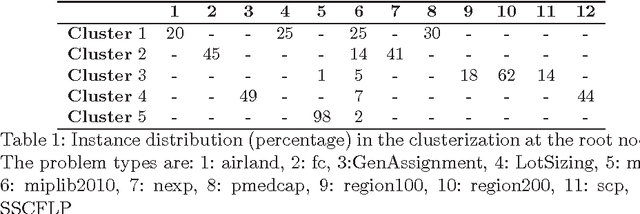


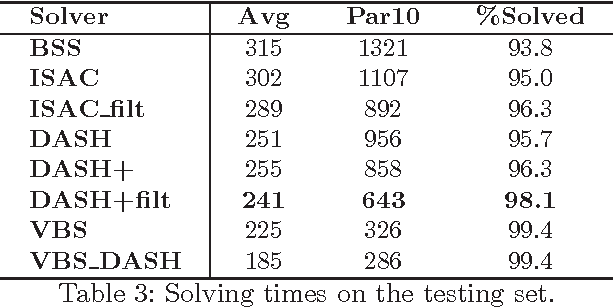
Abstract:Complete tree search is a highly effective method for tackling MIP problems, and over the years, a plethora of branching heuristics have been introduced to further refine the technique for varying problems. Recently, portfolio algorithms have taken the process a step further, trying to predict the best heuristic for each instance at hand. However, the motivation behind algorithm selection can be taken further still, and used to dynamically choose the most appropriate algorithm for each encountered subproblem. In this paper we identify a feature space that captures both the evolution of the problem in the branching tree and the similarity among subproblems of instances from the same MIP models. We show how to exploit these features to decide the best time to switch the branching heuristic and then show how such a system can be trained efficiently. Experiments on a highly heterogeneous collection of MIP instances show significant gains over the pure algorithm selection approach that for a given instance uses only a single heuristic throughout the search.
 Add to Chrome
Add to Chrome Add to Firefox
Add to Firefox Add to Edge
Add to Edge